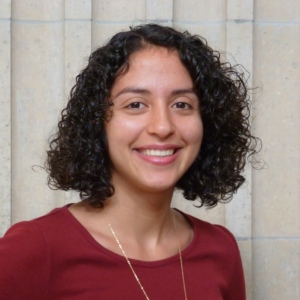News
Meet the Fellows: 2019 Newcombe Fellow María José Méndez
 The Charlotte W. Newcombe Doctoral Dissertation Fellowship is the nation’s largest and most prestigious award for Ph.D. candidates in the humanities and social sciences addressing questions of ethical and religious values. The 2019 class of Fellows includes María José Méndez, a doctoral candidate in political science at the University of Minnesota. María José describes the origins of her work:
The Charlotte W. Newcombe Doctoral Dissertation Fellowship is the nation’s largest and most prestigious award for Ph.D. candidates in the humanities and social sciences addressing questions of ethical and religious values. The 2019 class of Fellows includes María José Méndez, a doctoral candidate in political science at the University of Minnesota. María José describes the origins of her work:
During my upbringing in Honduras, transnational gangs were the “savage other” against which many Hondurans defined their moral character. I remember being frightened by images of heavily tattooed young men throwing gang signs from prisons when grandpa and I watched the daily evening news. From an early age, I learned to associate gangs with destruction and the dead bodies that covered the front pages of our newspapers. I learned that mano dura [iron fist policies] was what they deserved for being anti-sociales [anti-social], a term still used to describe them. These policies were implemented after the U.S. extended to Central America its war on crime, first through the deportation of immigrant gang youth, then through the exportation of its punitive strategies.
I don’t recall when I began to unlearn my bias against gangs, but I recall an unexpected encounter that compelled me to overcome them. In 2016, I joined an activist caravan calling for an end to the War on Drugs. I travelled with pastors, human rights defenders, artists, and relatives of the disappeared through violence-affected regions in Mesoamerica. On an eight-hour bus ride across Guatemala, I sat next to a young pastor who worked closely with gang-involved youth in the urban peripheries of San Salvador. The violence attributed to gangs in the region looked radically different when considering the complex social entanglements that Nelson narrated to me. He shared stories about inhabitants of marginalized neighborhoods heavily depending on gangs for their economic survival and sense of identity. By the end of our trip, I learned that Nelson had been a gang member himself. My travel companion, the storyteller with whom I tried to make meaning out of the work performed by gangs and the pain felt and produced by them, slowly replaced the tv gangster icon that was very much etched on my visual memory. And so, a dissertation seeking to reframe gang violence in Central America from the perspectives of those most closely associated and affected by it was born.
María José’s dissertation, titled The work of violence: Inside Central America’s illicit economies and socio-ethical worlds, examines the ethical dilemmas and political-economic entanglements of gang violence in Central America. For more information on the 2019 Newcombe Fellows, click here.

